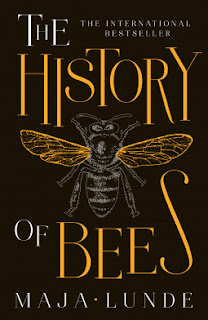Book Review
"...in order to live in nature, with nature, we must detach ourselves from the nature in ourselves."
The History of Bees
The History of Bees is a wonderfully written but sometimes slow look at the lives of three different beekeepers. It's also a truly terrifying examination of how important bees are to the world and our existence.
BLURB
In the spirit of Station Eleven and Never Let Me Go, this dazzling and ambitious literary debut follows three generations of beekeepers from the past, present, and future, weaving a spellbinding story of their relationship to the bees – and to their children and one another – against the backdrop of an urgent, global crisis.
England, 1851. William is a biologist and seed merchant, who sets out to build a new type of beehive—one that will give both him and his children honour and fame.
United States, 2007. George is a beekeeper and fights an uphill battle against modern farming, but hopes that his son can be their salvation.
China, 2098. Tao hand paints pollen onto the fruit trees now that the bees have long since disappeared. When Tao’s young son is taken away by the authorities after a tragic accident—and is kept in the dark about his whereabouts and condition—she sets out on a grueling journey to find out what happened to him.
Haunting, illuminating, and deftly written, The History of Bees joins these three very different narratives into one gripping and thought provoking story that is just as much about the powerful relationships between children and parents as it is about our very relationship to nature and humanity.
Maja Lunde seems to be good at writing dystopian, apocalyptic style fiction but also excellent at developing characters with very human traits and personalities. The History of Bees beautifully blends science fiction and literary fiction with a look at how the world would function if the bee population declines. It is quite terrifying as this is an issue that is happening right now and the Colony Collapse Disorder that George deals with in the 'present' is something real.
It's also really interesting learning about bees. Some of my family members keep bees so I know a little of the basics, but Lunde goes into detail of their society and how they work together not just for themselves but for the environment. At times the description of bees does feel a little text book heavy with the descriptions, but she manages to balance it quite well as you can tell she is passionate about them.
Bees are vital to the story but the characters of the beekeepers and their families keep you reading The History of Bees. They are very human and recognisable, and I found myself feeling frustration, pity, animosity, humour and empathy at different points throughout their stories.
I also liked that, even though they were set in different times, the main characters are subtly linked with each other. They also tackle similar issues, not just with the bees but also within their families, there is a lot of focus on parents and children and the relationship between them, which Lunde writes wonderfully.
The pacing of the book is a little difficult; at times I was addicted and at other points it felt like I was wading through the book. It is a little heavy going sometimes and it felt like a book I should read instead of wanted to. But this did shift as I reached different parts.
Ultimately, The History of Bees is an interesting and important novel and I think it will make waves with its subject matter, and if it doesn't, then it should.
My rating: 3.5/5 (rounded up to 4 stars for Goodreads and NetGalley etc)
I received a copy of The History of Bees via NetGalley in exchange for an honest review. My thanks to the author and publisher.


No comments:
Post a Comment